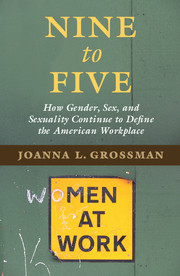Book contents
- Frontmatter
- Dedication
- Contents
- Foreword
- Acknowledgments
- Introduction
- PART I WHAT IS SEX DISCRIMINATION?
- 1 Sexual Jealousy
- 2 Too Hot to Be a Dental Hygienist?
- 3 A Twist on the Problem of Sex Inequality in Coaching
- 4 Mixed Motives
- 5 Sex Stereotyping and Dress Codes
- 6 A Victory for Transgender Employees
- 7 How Fast Must Female Transit Officers Run?
- 8 Who Is Protected by Antidiscrimination Laws?
- 9 Punishing the Coach Who Stood Up for His Female Athletes
- 10 Broader Protection against Workplace Retaliation
- 11 The Supreme Court Protects Retaliation Victims but Still Leaves Gaps in the Law
- PART II SEXUAL HARASSMENT
- PART III PREGNANT WOMEN AND MOTHERS AT WORK
- PART IV FEMALE BREADWINNERS AND THE GLASS CEILING
- Conclusion
- Notes
- Index
11 - The Supreme Court Protects Retaliation Victims but Still Leaves Gaps in the Law
from PART I - WHAT IS SEX DISCRIMINATION?
Published online by Cambridge University Press: 05 May 2016
- Frontmatter
- Dedication
- Contents
- Foreword
- Acknowledgments
- Introduction
- PART I WHAT IS SEX DISCRIMINATION?
- 1 Sexual Jealousy
- 2 Too Hot to Be a Dental Hygienist?
- 3 A Twist on the Problem of Sex Inequality in Coaching
- 4 Mixed Motives
- 5 Sex Stereotyping and Dress Codes
- 6 A Victory for Transgender Employees
- 7 How Fast Must Female Transit Officers Run?
- 8 Who Is Protected by Antidiscrimination Laws?
- 9 Punishing the Coach Who Stood Up for His Female Athletes
- 10 Broader Protection against Workplace Retaliation
- 11 The Supreme Court Protects Retaliation Victims but Still Leaves Gaps in the Law
- PART II SEXUAL HARASSMENT
- PART III PREGNANT WOMEN AND MOTHERS AT WORK
- PART IV FEMALE BREADWINNERS AND THE GLASS CEILING
- Conclusion
- Notes
- Index
Summary
The Supreme Court voted unanimously in Crawford v. Metropolitan Government of Nashville and Davidson County to reverse a federal appellate ruling that had denied protection from retaliation to employees who participate as witnesses in an employer's internal investigation of sexual harassment charges brought by other employees. This was a clear win for victims of discrimination, but the ruling stops short of a slam dunk for employees who risk retaliation for participating in an employer investigation into discrimination charges.
The Court's ruling in Crawford was essential to keeping the entire liability scheme under Title VII from becoming a charade – one in which employers avoid liability by conducting internal investigations but render such procedures useless by deterring employees from coming forward with information. The appellate decision in Crawford was an obvious obstacle to the integrity of Title VII's enforcement scheme and needed to be reversed. Even so, however, further development of the law is needed to ensure the adequate protection of employees from retaliation, and to fully enforce Title VII's core promise of nondiscrimination.
THE CLAIM OF RETALIATION IN CRAWFORD
Here are the facts in Crawford itself: Vicky Crawford had worked for city government for thirty years when she was called in by a human resources officer to answer questions about allegations by other employees of “inappropriate behavior” by the city school district's director of employee relations, Gene Hughes. Although Crawford herself had been sexually harassed by Hughes, she never filed a complaint because, as she explained, Hughes was the very person responsible for receiving such complaints. Other employees, however, did come forward with allegations of Hughes's sexually harassing behavior, prompting the employer to investigate. At the time the internal investigation took place, none of the complaining employees had yet filed a charge with the EEOC.
Crawford, along with two other women interviewed in the course of the investigation, expressed the fear that she would be fired if she told the truth about Hughes. As she saw it, Hughes was “very good friends” with the school district director. Nevertheless, Crawford cooperated in the investigation and told investigators Hughes had, in fact, sexually harassed her and other employees, describing his lewd behavior in detail.
- Type
- Chapter
- Information
- Nine to FiveHow Gender, Sex, and Sexuality Continue to Define the American Workplace, pp. 64 - 70Publisher: Cambridge University PressPrint publication year: 2016



